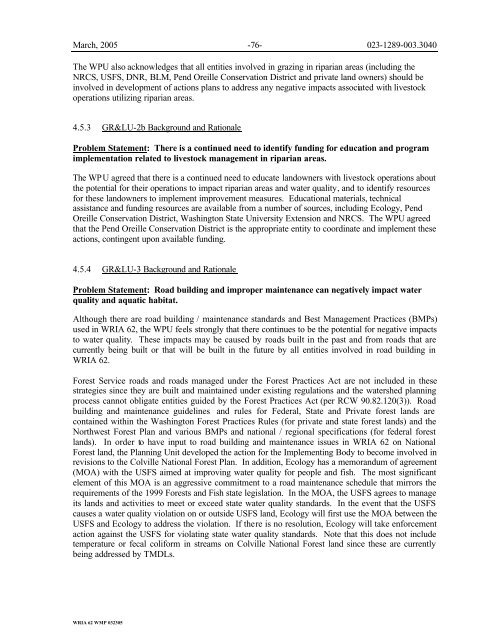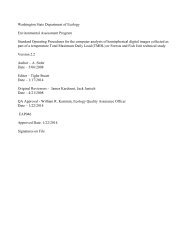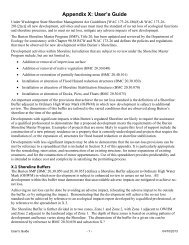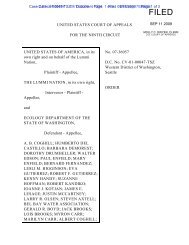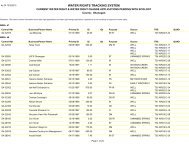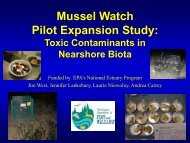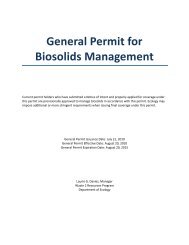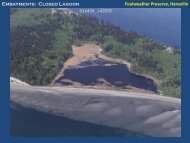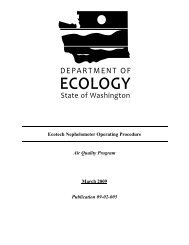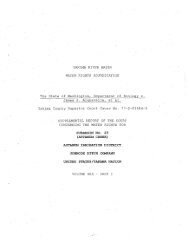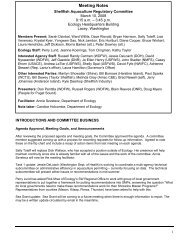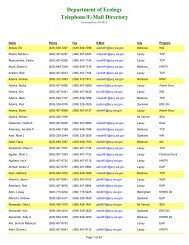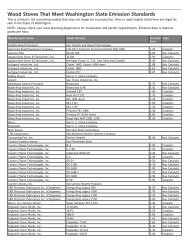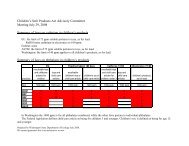WRIA 62 WMP 032305 - Washington State Department of Ecology
WRIA 62 WMP 032305 - Washington State Department of Ecology
WRIA 62 WMP 032305 - Washington State Department of Ecology
Create successful ePaper yourself
Turn your PDF publications into a flip-book with our unique Google optimized e-Paper software.
March, 2005 -76- 023-1289-003.3040<br />
The WPU also acknowledges that all entities involved in grazing in riparian areas (including the<br />
NRCS, USFS, DNR, BLM, Pend Oreille Conservation District and private land owners) should be<br />
involved in development <strong>of</strong> actions plans to address any negative impacts associated with livestock<br />
operations utilizing riparian areas.<br />
4.5.3 GR&LU-2b Background and Rationale<br />
Problem <strong>State</strong>ment: There is a continued need to identify funding for education and program<br />
implementation related to livestock management in riparian areas.<br />
The WPU agreed that there is a continued need to educate landowners with livestock operations about<br />
the potential for their operations to impact riparian areas and water quality, and to identify resources<br />
for these landowners to implement improvement measures. Educational materials, technical<br />
assistance and funding resources are available from a number <strong>of</strong> sources, including <strong>Ecology</strong>, Pend<br />
Oreille Conservation District, <strong>Washington</strong> <strong>State</strong> University Extension and NRCS. The WPU agreed<br />
that the Pend Oreille Conservation District is the appropriate entity to coordinate and implement these<br />
actions, contingent upon available funding.<br />
4.5.4 GR&LU-3 Background and Rationale<br />
Problem <strong>State</strong>ment: Road building and improper maintenance can negatively impact water<br />
quality and aquatic habitat.<br />
Although there are road building / maintenance standards and Best Management Practices (BMPs)<br />
used in <strong>WRIA</strong> <strong>62</strong>, the WPU feels strongly that there continues to be the potential for negative impacts<br />
to water quality. These impacts may be caused by roads built in the past and from roads that are<br />
currently being built or that will be built in the future by all entities involved in road building in<br />
<strong>WRIA</strong> <strong>62</strong>.<br />
Forest Service roads and roads managed under the Forest Practices Act are not included in these<br />
strategies since they are built and maintained under existing regulations and the watershed planning<br />
process cannot obligate entities guided by the Forest Practices Act (per RCW 90.82.120(3)). Road<br />
building and maintenance guidelines and rules for Federal, <strong>State</strong> and Private forest lands are<br />
contained within the <strong>Washington</strong> Forest Practices Rules (for private and state forest lands) and the<br />
Northwest Forest Plan and various BMPs and national / regional specifications (for federal forest<br />
lands). In order to have input to road building and maintenance issues in <strong>WRIA</strong> <strong>62</strong> on National<br />
Forest land, the Planning Unit developed the action for the Implementing Body to become involved in<br />
revisions to the Colville National Forest Plan. In addition, <strong>Ecology</strong> has a memorandum <strong>of</strong> agreement<br />
(MOA) with the USFS aimed at improving water quality for people and fish. The most significant<br />
element <strong>of</strong> this MOA is an aggressive commitment to a road maintenance schedule that mirrors the<br />
requirements <strong>of</strong> the 1999 Forests and Fish state legislation. In the MOA, the USFS agrees to manage<br />
its lands and activities to meet or exceed state water quality standards. In the event that the USFS<br />
causes a water quality violation on or outside USFS land, <strong>Ecology</strong> will first use the MOA between the<br />
USFS and <strong>Ecology</strong> to address the violation. If there is no resolution, <strong>Ecology</strong> will take enforcement<br />
action against the USFS for violating state water quality standards. Note that this does not include<br />
temperature or fecal coliform in streams on Colville National Forest land since these are currently<br />
being addressed by TMDLs.<br />
<strong>WRIA</strong> <strong>62</strong> <strong>WMP</strong> <strong>032305</strong>


